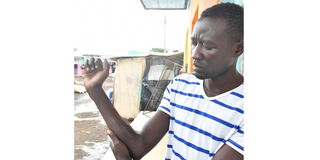I helplessly watched as hippo mauled my friend to death

Henry Lengilo shows the scars he sustained after being attacked by a rogue hippo in the waters of Lake Naivasha
He flinches, remembering his close shave with death. Not once, not twice, but three times.
"I helplessly watched as my best friend was mauled to death by a ferocious hippo on the shores of Lake Naivasha; I could do nothing…it was an unscripted horror movie that was unfolding as l watched." Thanking God for being alive, fisherman Henry Lengilo spots permanent scars, a stark reminder of the moments he survived by the skin of his teeth.
Despite the danger, he always finds his way back to the dangerous waters, for lack of options for eking out a living.
Last Saturday, he watched as his friend was mauled to death by a ferocious hippo nicknamed “maskio” (ears) by lake operators.
The two were casting their nets at Kongoni on the shores of Lake Naivasha when tragedy struck.
He could not do anything, too scared to move. His friend cried out for help, but the fisherman froze.
The attack by the stealthy animal was swift, precise and lethal. The victim did not react.
“He was badly injured. His last words were inaudible. With assistance from a friend, we managed to get him out of the waters but, unfortunately, he did not survive,” says Lengilo.
At that point, he goes quiet, sighing. “We are yet to bury him… he was an orphan married to an orphan. He was doing his best to provide for the family, but he is no more."
“We were like Siamese twins, (he was) a brother, a good footballer who pulled strings in the middle of the field. I was his fan,” he continues.
The magnitude of the incident is quite obvious during the interview. The fisherman swallows hard, reminiscing about the moment they shared on the chancy waters and on the field, celebrating an audacious goal by the Mizizi team that the victim played for.
“The lake was our only source of income. We were alive to the dangers but we had limited options. Both of us had young families that we worked hard to provide for but on that day, my friend was not as lucky,” adds Lengilo.
The foot fisher himself survived by a whisker after being attacked by what he believes was the same hippo. He suffered serious injuries on both hands and his left leg.
“I lost use of my two right fingers. I was also attacked in a similar manner but managed to dodge death. I was unwilling to get back to the risky waters, but ran out of alternatives,” he says.
Lengilo suffered life-threatening injuries in the attack and now walks with a limp. He and others are organising the burial of his friend and he is unsure of his next move.
“My friend only adds to the statistics of persons killed by hippos in Lake Naivasha. Many of my colleagues have also been maimed, and have permanent disability,” he says.
Lengilo claims that the deaths and maiming have been by Maskio, the lone hippo.
“It is a conspicuous animal roaming either on the edges of Lake Naivasha or deep ends. We have complained to the relevant authorities to track down the nocturnal animal but nothing much is happening,” he says.
Lengilo says they are in the process of forming an association that will cater for the welfare of those who have been injured while working in the freshwater lake.
“Some of them are depending on handouts for upkeep. It is a miserable life. I am also appealing to the county government of Nakuru to at least give us the documents and fishing boat that will enable us to engage in legal fishing,” he pleads.
According to an official report released by the Kenya Wildlife Service officials in 2020, at least six fishermen were killed, and three others maimed by hippos within a span of six months.
In the past year, at least 20 people have been killed and many others left nursing injuries.
In June 2022, two fishermen were killed, with hospital records indicating that at least one person is attacked every month, with 80 per cent of the victims suffering permanent injuries.
At the same time, a class seven pupil was attacked by the ferocious animals as he took a nap on the shores of the lake.





